Olivia Invites us to her Malibu Home
90s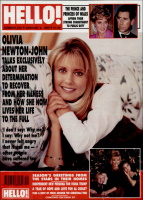
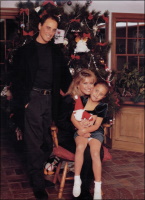
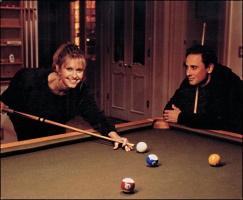
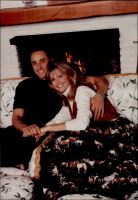
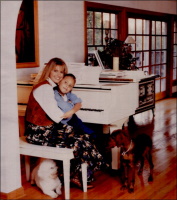
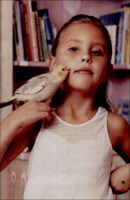
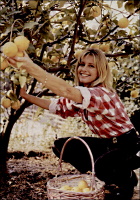
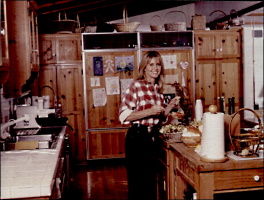
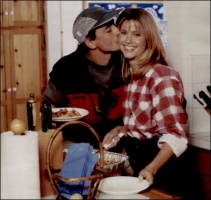
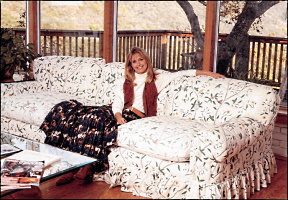
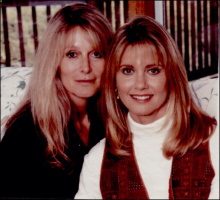
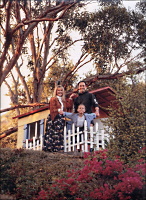
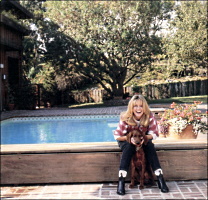
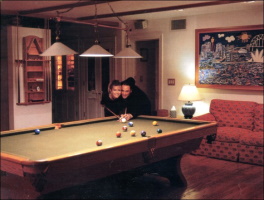
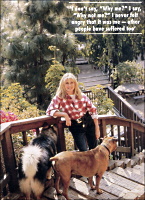
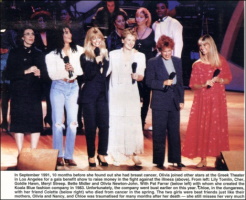
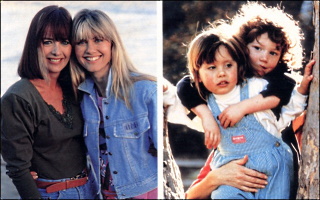

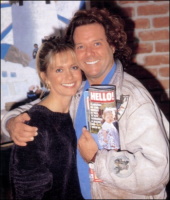
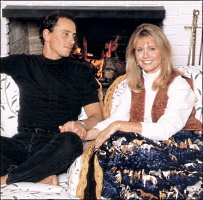
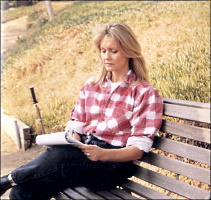
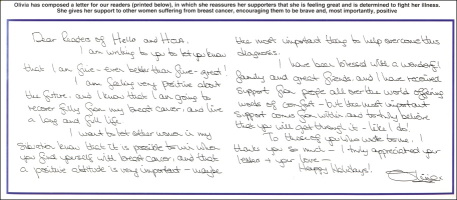
Ed- Hello is an oversized magazine and to fit it on the scanner back in the 90s we needed to scan the photos separately. Photo 19 is Olivia with her then manager Billy Sammeth.
Olivia Newton-John has more reason than most to hope and pray for a bright new year. The past 12 months will go down as the most traumatic of her life. In July, on the very day that her father died of a brain tumour, Olivia discovered that she too had cancer and had to undergo a gruelling operation to remove part of her right breast. She is presently receiving exhausting chemotherapy treatment every three weeks. Bereavement and cancer were not, however, new words in the singer/ actress's life: two months earlier her best friend's daughter Colette who, Olivia says, was like my child,
died from cancer after a year of intensive and distressing chemotherapy and radiation treatments.
Prior to this, her sports fashion company, Koala Blue, which she started with fellow Australian singer Pat Farrar in 1983 went bust, costing her millions. Not a lot to be hopeful about! Positive thinking, however, is proving to be Olivia's greatest weapon in fighting her cancer and, if attitude alone can cure, then she has every reason to be optimistic about the future.
The 43-year-old star of Grease invited us to her ranch in Malibu where she lives with her husband, actor Matt Lattanzi, 11 years her junior, and their daughter, six-year-old Chloe. Overlooking the Pacific Ocean and surrounded by trees, her wooden mansion would be most people's idea of a dream home but possessions mean little to the actress these days. Six tail-wagging dogs bound up to greet us on our arrival and a smiling and serene Olivia takes us around her rustic-style house, the focal point of which is the spacious and welcoming kitchen.
To judge from her easy humour and radiant smile, you would never guess that this woman was suffering from a life-threatening illness. But life is sweet when it can be taken away and Olivia is putting all her energy into enjoying the here and the now and beating the disease that has restructured her life.
Olivia, this year has been a very hard year for you. Do you wish 1992 had never happened?
Do I wish it hadn't happened? Of course, we all wish that we didn't have to go through pain, but that's part of life, and you grow from it. In fact, I find that what I've gone through this year, as much as it's been bad, it's been good. There have been really good things because of it.
You lost your father this year, too, didn't you?
The same day. My father died on my brother's birthday, and I found out I had cancer. All on the same day.
Which day was that?
July 3rd, I'll tell you the story: my husband and I had gone on a vacation for that weekend. When we got there he got a phone call. He heard that my father had died and the doctors bad said they needed to see me. So I knew. He didn't tell me the whole weekend about my cancer, because he didn't want to spoil my vacation. He'd already told me about my father. So he suffered that whole weekend by himself. He didn't tell anybody. I think that was a really wonderful thing to do. He waited until I got home, and I'd had a couple of days off, and then he told me.
How did your husband tell you?
He told me the doctor wanted me to go back and see him and I knew then, because doctors don't call you into their office unless there's something wrong. He didn't tell me more than that, but I asked if it was what I thought it was. He didn't say an awful lot, but we kind of knew. He wanted me to talk to the doctor first and let him explain it to me, but I knew. To tell you the truth, that day is a bot of a blur. I remember some, but I don't remember all of it.
How did you know there was something wrong with you in the first place?
I felt something wasn't right with me - deep down I knew something was wrong. I had a biopsy which was negative. But the doctor knew there was something wrong, so he made me have a lobectomy, that's when they discovered something was wrong.
Did your husband go back with you to the doctor?
Yes, I went with my husband. I sat down and said to the doctor
So I have cancer
And he said Yes.
I knew by the fact that he wanted me to go into the office that I had breast cancer. I knew it.
How did it feel when it was confirmed?
I didn't feel anything at first. Then later, when I was by myself in the examining room, you know, your stomach drops a few times. But I kept telling myself 'You'll be okay, you've just got to go through this.' Of course there are always moments when you think you won't be okay, especially at the beginning when all this information is coming in. But underneath I knew I'd be okay.
How did Matt react?
He was very strong, very strong and very supportive and he always said, 'You're going to be fine. We got it early.' He was wonderful. He never showed me any fear.
When did they operate?
July l4th-Bastille Day!
The first night you knew you had cancer how did you feel?
The first night when I got home - the day I was told - that's when it hit me. I woke up in the middle of the night and walked downstairs, and my legs felt like lead. And then I imagined that it was all through my body and that I was going to die. That first night was the worst night ever of my life, I think. The next day, I snapped out of it, but that first night was difficult because I had to go through tests the next day that would let me know if it was anywhere else, and that was very scary, that day, waiting to find out.
It was very funny those two days, I couldn't stop making jokes and laughing. It was like a release from it. And my friend Nancy, Colette's mother, was with me all the time and she's very funny and very strong. So, she would keep me laughing the whole time. You know, there's always humour in tragedy, and I try to make it that way.
Can you tell us about Colette?
Colette was... she was like my child. She was my best friend's daughter. We were pregnant together and had our babies six weeks apart. My daughter Chloe and Colette were best friends, so it was very, very difficult watching her when she got sick. And then to watch her go through surgery and chemotherapy and radiation. We thought that maybe she was going to get better but then... They couldn't do anything about it, they couldn't save her. 'It was a big tragedy, very painful for me and for my little girl - very, very painful for her. She still misses her friend a lot.
What kind of cancer did she have?
She had the type that goes to your kidney. Unfortunately, it had spread to her lungs and it was too late. They couldn't stop it, it was too advanced.
How old was she?
She was four when she got sick and five when she died.
How did your daughter react to her illness?
At the time, Chloe believed that she would get better - we all hoped she would. But I think in the last few months Chloe sensed that she was going to die because children know, they're very instinctive, even though we never discussed the possibility that she might die. We always thought she was going to get well and we were trying everything we could. It was a very difficult time for Chloe; she was very upset and very traumatised for a long time.
Did your daughter know that you were ill?
She knew I had something that I had to have an operation for, on my breast. I told her that, but I never mentioned the word cancer because her best friend had died of it, and it would only mean that to her. So it was a rule in my house that you were not to say that word; just that mummy's not well, that she's going to have an operation. I wanted to show her that you can go into a hospital and come out and you're okay. She came to visit me in hospital but she was afraid. I took her to a therapist so we could discuss it as a family, and she could tell the therapist how she was feeling and do drawings of how she was feeling, which was very important. Then she would visit me in hospital and see me come home and see that mummy was fine. During my treatments she has known that I haven't felt well some days, but she doesn't know why.
Does what's happened make you feel you've been unlucky in life?
I think I've been very lucky. I think I'm blessed.
But you've certainly had your fair share of blows.
Yes, but then everybody has something, and I think it all goes to make you a better person. You can't go through life without any pain, it would be too unrealistic, and I think, up to a few years ago, perhaps my life was pretty unrealistic. I didn't have a lot of major tragedies. I had problems - everybody has problems in their private lives - but these were the biggest hurdles I'd ever had to face. Right now I think they are making me grow. That's part of life.
How did you deal with this latest blow?
Well, obviously, I was shocked though not totally surprised because I knew, I felt something was wrong with, me. Deep down I knew something wasn't quite right but I'm very strong and I decided that I had to get through surgery and get through a lot of things. I didn't really attempt to deal with it until I'd got through that but, deep down, I felt I was going to be okay. I knew it was going to be difficult but it was something that had to be done and I knew I was going to be all right. You can't escape from it and so I just learned to deal with the feelings as they came. It wasn't easy but what else can you do? I just dealt with lt. I had a lot of good friends to talk to.
Have you always been a fighter?
I've never had to face a problem like this before. But I think I have a strong will, a love for life and a positive attitude.
Did you ever at any point get angry and ask yourself: 'Why me?'
I don't say 'Why me?' I say, 'Why not me?' I mean, it could happen to anybody so why shouldn't it happen to me? It's strange in that I eat very well, I exercise regularly and I generally take care of my body. I hardly ever drink, I don't smoke, but my stress level was really high so I can see why it could have happened. But I never felt angry that it was me - other people have suffered, too.
Have these blows changed the way you look at life?
That's the big question. Basically, I think I have good values anyway about my family, friends and life, but all this has made me realise the value of simplicity, the value of nature and of relationships, much more than that of money and position. That's not what makes you happy it's people, and animals for me, too. I think I've always had these values but they have been reinforced for me now.
Are there things that you value now that you didn't before?
Yes, because now I have more time to see them whereas before my mind was always somewhere else. What's different is that I now live for the moment. I'm living. When I'm drinking a glass of water, I'm drinking a glass of water and I'm not thinking about five other things at the same time - I'm right here. That's made me a lot calmer. I'm much more centred now and I don't have so many distractions. I think it's very important for my peace of mind.
What little things would you may have become more important to you now?
The things I've talked about really. I think they always were only I just didn't focus on them. Now I want more peace and a more quiet time in life.
Do you get depressed?
Sometimes. Everybody has depressions from time to time, especially if you're going through a life-threatening illness. There are moments when you're scared, but it doesn't last long . . just a little while.
Are you happy with yourself? What things in life would you still like to do?
At this point in my life, I'm learning to be happy with everything. I think it's really important to feel good about yourself, so that's something I'm working on. I certainly feel there is more I would like to do for the world: I would like to help other women who have gone through what I have. I'd like to do more, but right now I'm concentrating on just healing myself and feeling good - but there'll be time to do more in the future.
How do you plan to help other women?
I'm going to write a book about my experience. I have been reading a book written by a journalist who gives her version of battling against breast cancer and I would like to do the same.
Have you got to know many people suffering from the same illness
I've had some letters from people -very nice people from all over the world - and my oncologist put me in touch with a group of women who have breast cancer; who are going through treatment or who have finished with it years ago. We all had lunch together and it was wonderful. I spoke to one woman alter my first chemotherapy session and Kate Jackson, the actress, called me in the hospital as she had it too. I received a lot of support.
Some newspapers exaggerated the situation claiming you were on the point of dying. Did that sensationalism make you angry?
I suppose they thought it would sell more papers to say I was on my way out It made me angry for the people I care about who would read such things and panic. It was just very negative. I don't consider myself ill - I had cancer and I'm undergoing treatment for it but they write you're this and you're that, you're depressed, you're crying, you're really sick. It made me angry because it's such a negative feedback. What I need are people telling me I'm doing well and giving me support, not the other way round. Such stories also encourage other people to be negative and that's why cancer scares people. I'm fortunate that they caught it early and I'm coping with it so well. To keep emphasising the negative is not helpful, not to me or to anyone else who's going through it
Does anything positive come from the suffering?
I think I've grown a lot from it, although I certainly wouldn't wish it on myself. One of my doctors said: 'You can either make this the worst experience of your life or a really good experience.' I think that I've made it into a really good experience.
What would you like to say to those people who said you were very ill?
I want to tell them and everybody that I feel very positive and strong. I'm nearly finished with my treatments and I feel really good about myself and about the fact that you can conquer illness. A lot of it is mental and you have to keep up a very positive attitude.
Are you sure you will overcome it?
Yes, I am.
Would you like to add anything else?
If there are any women out there reading this who discover a lump in their breast and they are afraid to go and have it investigated because they're afraid of what it could mean, I would say: 'Don't be afraid because the earlier you find it the better.' It may not necessarily be cancer but don't be afraid: drugs and surgery are now available and they can get through it. It doesn't have to be a negative experience. It's not pleasant, but you'll grow a lot from it As well as the negative, there will be a positive side to it.
NEXT WEEK: We accompany Olivia on an exciting environmental trip to the Amazon. She looks back on the events that have made her what she is today, fired her interest in ecological issues, and enabled her to transform a cruel illness into a positive experience.